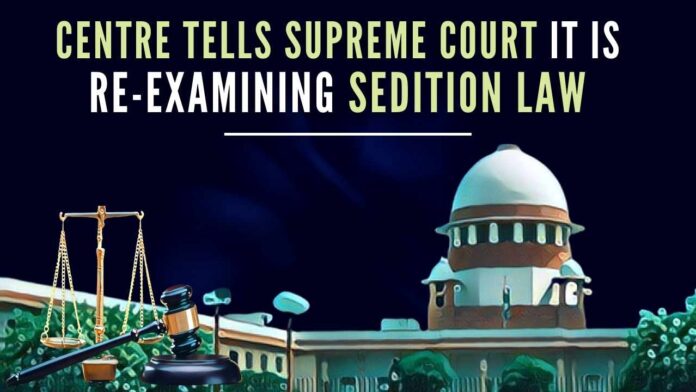
Centre to SC: Will relook at Sedition Law, you defer hearing
Changing the stand in two days, the Centre on Monday told the Supreme Court of India not to invest time in examining the validity of sedition law as it has decided to go for re-consideration of the provisions by a “competent forum”. Centre also said it was cognizant of various views, and concerns about civil liberties while being committed to protecting the “sovereignty and integrity of this great nation”.
Ministry of Home Affairs (MHA), in an affidavit, referred to the views of Prime Minister Narendra Modi on shedding “colonial baggage” and said he has been in favour of the protection of civil liberties and respect of human rights, and in that spirit, over 1500 outdated laws and over 25,000 compliance burdens have been scrapped. MHA’s affidavit said the Prime Minister has said that India, as a nation, has to work even harder to shed colonial baggage that has passed its utility which includes outdated laws and practices.
The bench of Chief Justice N V Ramana and Justices Surya Kant and Hima Kohli on May 5 had said it would hear arguments on May 10 on the legal question of whether the pleas challenging the colonial-era penal law on sedition be referred to a larger bench for reconsidering the 1962 verdict of a five-judge constitution bench in the Kedar Nath Singh case.
“The Government, being fully cognizant of various views being expressed on the subject of sedition and also having considered the concerns of civil liberties and human rights, while committed to maintain and protect the sovereignty and integrity of this great nation, has decided to re-examine and re-consider the provisions of Section 124A of the IPC which can only be done before the competent forum,” said the MHA affidavit.
The government urged the apex court that in view of the decision to reconsider the law, “this court may not invest time in examining the validity of Section 124A once again and be pleased to await the exercise of reconsideration to be undertaken by the Government of India before an appropriate forum where such reconsideration is constitutionally permitted.” The government said concerns have been raised about the application and abuse of sedition law for purposes not intended by the provisions.
“The Prime Minister has been cognizant of various views expressed on the subject and has also periodically, in various forums, expressed his clear and unequivocal views in favour of protection of civil liberties, respect of human rights, and giving meaning to the constitutionally cherished freedoms by the people of the country,” it said, adding that Prime Minister has repeatedly said one of India’s strengths is the diverse thought streams that beautifully flourish here.
“The PM believes that at a time when the country is marking ‘Azadi ka Amrit Mahotsav‘ (75 years since independence), we need to, as a nation, work even harder to shed colonial baggage that has passed its utility which includes outdated laws colonial laws and practice,” it said, adding that various offences which were causing mindless hindrances to people have been decriminalized.
MHA’s affidavit said the public at large including jurists agrees about the need for statutory provisions to deal with serious offences of divisive nature affecting the very sovereignty and integrity of the country. “Requiring a penal provision for such purposes is generally accepted by everyone in legitimate State interest,” the affidavit said.
Two days back, in another written submission, filed earlier, the Centre defended the penal law and the 1962 verdict (Kedar Nath Saini Judgment) of a Constitution bench upholding its validity, saying they have withstood “the test of time” about six decades and the instances of its abuse would never be a justification of reconsideration.
PGurus is now on Telegram. Click here to join our channel and stay updated with all the latest news and views
For all the latest updates, download PGurus App.
- Supreme Court rejects plea to tally all VVPAT slips with EVM votes; says ‘no going back to paper ballot’ - April 26, 2024
- US report citing human rights violations is deeply biased: India - April 25, 2024
- Kotak Mahindra Bank shares tank 13%. Market Cap erodes by Rs.37,721 cr post-RBI action - April 25, 2024










